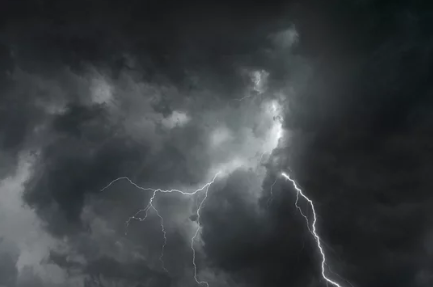Do you know about the deadly duo threatening our planet? Nuclear war and climate change, catastrophic forces, have the power to wreak havoc worldwide. In this article, we’ll explore the interconnectedness of these threats and their immediate and long-term consequences. Imagine the impact of a nuclear exchange: hurricane-force winds, widespread fires, and a chilling reduction in global precipitation. Such a scenario would lead to a global food crisis, disrupt ecosystems, exacerbate climate change, and pose a grave threat to human health. Let’s delve into the solutions and take action for a peaceful and sustainable future.
Immediate Impact of Nuclear Exchange
Within a four-mile radius, a one-megaton nuke would unleash winds equivalent to those in a Category 5 hurricane. The immediate impact of a nuclear exchange would be catastrophic. The intense winds would result in widespread destruction, causing buildings to collapse and infrastructure to crumble. The human casualties would be devastating, with immediate deaths from the blast and subsequent nuclear fallout. The ecological devastation would be immense, as the hurricane-force winds would ignite urban and wildland forest fires around the planet. These fires would release massive amounts of smoke and ash into the atmosphere, resulting in global cooling. The cooling would reduce global precipitation by about 10 percent and shorten the growing season in North America and Europe, leading to a humanitarian crisis. The combination of nuclear fallout, human casualties, ecological devastation, global cooling, and the resulting food and water shortages would create a dire situation for the affected populations. It is essential to understand the immediate impact of a nuclear exchange to comprehend the gravity of the situation and work towards preventing such a scenario.
Global Food Crisis and Marine Impact
To understand the devastating consequences of a nuclear war and climate change, you must consider the global food crisis and its impact on marine life. The combination of these two threats poses a significant risk to agriculture and the decline of fish populations, posing a threat to marine ecosystems. This has the potential to trigger a global hunger crisis and have long-lasting effects on biodiversity.
| Impact on Agriculture | Decline in Fish Population |
|---|---|
| – Reduced crop yields due to nuclear fallout and climate change | – War-related pollution and climate change negatively affect fish habitats |
| – Shortened growing seasons and decreased agricultural production | – Overfishing worsens with increased food scarcity |
| – Food shortages and price hikes due to disrupted supply chains | – Loss of marine species diversity and imbalance in the marine food chain |
The global food crisis resulting from these factors would have dire consequences for humanity. Declining yields and disrupted supply chains would lead to widespread hunger and malnutrition. Moreover, the decline in fish populations would not only impact food security but also threaten the delicate balance of marine ecosystems.
It is essential to recognize the interconnectedness of nuclear war, climate change, and their impact on agriculture and marine life. Addressing these issues requires urgent action to mitigate the risks, promote sustainable agricultural practices, and protect marine ecosystems. Only through comprehensive and coordinated efforts can we hope to avoid the catastrophic consequences of a global food crisis and the threat to our oceans.
Long-term Climate Consequences
The long-term climate consequences of nuclear war and climate change are a cause for grave concern. In the aftermath of a full-blown global conflict, a phenomenon known as nuclear fall would occur, exacerbating the already dire situation. One of the major consequences would be ocean acidification, which would have a devastating impact on marine ecosystems. The layer of smoke in the atmosphere would also lead to a significant depletion of the ozone layer, up to 75 percent. This would result in increased UV radiation, causing a pandemic of skin cancer and other medical issues. Even remote islands, often considered untouched by such global events, would not be spared, endangering the plants and animals that inhabit them. It is clear that the long-term climate consequences of nuclear war and climate change would have far-reaching and devastating effects on our planet. It is imperative that we take immediate and collective action to prevent such a catastrophic outcome.
Historical Connection Between Nuclear War and Climate Change
You may be surprised to learn that there is a historical connection between nuclear war and climate change, which has been explored and understood by scientists and experts in the field. The interconnection between these two disciplines is evident through various factors:
- Military interest: During the Cold War era, there was a significant military interest in meteorology. This highlighted the potential weaponization of weather, where the manipulation of climate patterns could be used as a strategic advantage.
- The Manhattan Project: Scientists involved in the development of nuclear weapons, such as John von Neumann, recognized the connection between hydrogen bombs and Earth’s climate. This understanding contributed to the concerns over nuclear winter and the ozone layer, which in turn increased awareness of global warming risks.
- Global warming risks: The understanding of the environmental consequences of nuclear weapons led to a greater understanding of the risks posed by global warming. Climate science and nuclear-weapons engineering became interconnected disciplines.
- The weaponization of weather: The military’s interest in meteorology during the Cold War era highlighted the potential manipulation of weather systems for military purposes. This recognition of the weaponization of weather further emphasized the link between nuclear war and climate change.
The historical connection between nuclear war and climate change demonstrates the complex relationship between these two critical issues. It underscores the importance of addressing both global warming and nuclear disarmament to ensure a safer and more sustainable future.
Rebuilding and the Importance of Peace for Climate Solutions
Addressing the historical connection between nuclear war and climate change, the importance of peace becomes evident in rebuilding and finding solutions to the climate crisis. Rebuilding after a nuclear war would present numerous challenges, particularly in terms of energy sources. Society’s attempt to rebuild would likely rely heavily on fossil fuels due to their accessibility, which would perpetuate the cycle of climate change. However, renewable energy solutions are crucial in mitigating the effects of climate change and achieving a sustainable future. The transition to renewable energy technologies requires peace, secure factories, educated engineers, and global trade networks. Without peace, these efforts would be hindered, making it difficult to implement and scale up renewable energy solutions. Solving climate change is a luxury of a peaceful planet. Peacebuilding efforts are essential for addressing climate change effectively, as they create the conditions necessary for the widespread adoption of renewable energy and the dismantling of fossil fuel reliance. Therefore, a planet at peace with itself is not only desirable, but also vital for rebuilding and finding sustainable solutions to the climate crisis.
Climate Disruption and Nuclear Conflict
Climate disruption and nuclear conflict pose a deadly combination that threatens the very fabric of our existence. The consequences of a nuclear war combined with the already escalating effects of climate disruption would be catastrophic. Here are the potential outcomes:
- Nuclear Winter: A full-blown global conflict could result in a nuclear winter, where smoke and dust from firestorms block sunlight, causing a drop in global temperatures and rainfall. This would lead to a significant disruption in ecosystems and agriculture.
- Global Famine: The shorter growing seasons and decreased agricultural production caused by nuclear conflict would result in global famine. In fact, a global nuclear war could lead to a 90% decrease in global average caloric production. The consequences for food security would be devastating.
- Regional Conflict: Even in a limited, regional nuclear conflict, the impact would be severe. It could lead to the deaths of over 2 billion people and exacerbate existing tensions, potentially spiraling into larger conflicts.
- Climate Disruption: The combination of nuclear conflict and climate disruption would further exacerbate the already dire situation. Global temperatures would be further affected, leading to even more extreme weather events and environmental instability.
It is clear that the potential consequences of a nuclear conflict combined with climate disruption are dire. The urgency to prevent both nuclear war and mitigate climate change has never been more critical. Our survival depends on global cooperation, disarmament efforts, and immediate action to address climate disruption.
Climate Change and the Danger of Nuclear War
The combination of climate change and the danger of nuclear war presents a grave threat to our planet and its inhabitants. The intersection of nuclear war and climate change gives rise to global insecurity, a potential humanitarian crisis, geopolitical tensions, environmental degradation, and the urgent need for nuclear disarmament. The impacts of climate change, such as rising sea levels, extreme weather events, and food and water scarcity, already contribute to armed conflicts and displacement. These environmental stresses amplify the danger of nuclear war by fueling global instability.
In the event of a nuclear conflict, the immediate impact would be devastating. The detonation of nuclear weapons would result in hurricane-force winds, fires, and the release of soot and ash into the atmosphere, leading to global cooling and decreased precipitation. This would cause a global food crisis, with significant declines in agricultural yields and marine life productivity. The long-term consequences include nuclear winter or nuclear fall, ocean acidification, ozone layer depletion, and increased UV radiation, which would have severe health and ecological impacts.
It is crucial to recognize the historical connection between nuclear war and climate change. Concerns over nuclear winter and the ozone layer contributed to the understanding of global warming risks. Climate science and nuclear-weapons engineering were interconnected disciplines, highlighting the potential weaponization of weather. While the worst fears of that time have not materialized, the risk remains.
To address the danger of nuclear war and climate change, we must prioritize nuclear disarmament and the rapid transition to renewable energy systems. The international community must work together to implement the UN Treaty on the Prohibition of Nuclear Weapons and take immediate action to reduce carbon emissions. Solving climate change and achieving peace are intertwined goals, as a planet at peace with itself is essential for effectively addressing climate change. It is imperative that we recognize the global insecurity, humanitarian crisis, geopolitical tensions, environmental degradation, and the urgent need for nuclear disarmament that arise from the intersection of nuclear war and climate change.
Environmental Consequences of Nuclear Weapons and Climate Change
The intersection of nuclear war and climate change has significant environmental consequences, which are exacerbated by the production and testing of nuclear weapons and the effects of global warming. The environmental consequences of nuclear weapons and climate change can be summarized as follows:
- Nuclear waste: The production and testing of nuclear weapons generate large amounts of radioactive waste, which poses a significant environmental hazard. Improper disposal and storage of nuclear waste can lead to environmental contamination and long-term health risks.
- Rising sea levels: Climate change is causing sea levels to rise, increasing the risks of coastal flooding and erosion. This poses a threat to nuclear weapons facilities located near coastlines, as rising sea levels can potentially lead to the release of radioactive waste into the environment.
- Uranium mining: The mining of uranium, which is used as fuel in nuclear weapons, can have detrimental environmental impacts. It can result in habitat destruction, water pollution, and the release of radioactive materials into the environment.
- Environmental contamination: The production and testing of nuclear weapons can contaminate the environment with radioactive materials. This contamination can have long-lasting effects on ecosystems and human health.
- Radioactive waste release: The improper handling and storage of radioactive waste can lead to accidental releases into the environment. These releases can contaminate soil, water, and air, posing risks to both human and environmental health.
It is crucial to address these environmental consequences and ensure proper management and disposal of nuclear waste to minimize the impact on the environment and human well-being.
Economic and Social Justice Issues
Addressing economic and social justice issues is crucial when considering the intersection of nuclear war and climate change. The impacts of these threats are not evenly distributed, with developing countries and marginalized communities bearing the brunt of the consequences. Socioeconomic disparities are exacerbated by nuclear weapons spending, which diverts funds from sustainable and green technologies. In fact, nine nuclear-armed countries spend a staggering $156,000 per minute on their nuclear weapons. This investment comes at the expense of socioeconomic development, perpetuating inequality and hindering progress towards a more just and equitable world.
To address these issues, nuclear disarmament is essential. Redirecting the resources currently allocated to nuclear weapons towards green technology and socioeconomic development can help bridge the gap and promote greater equality. Nuclear weapons divestment, in which individuals and institutions remove their financial support from companies involved in the production of these weapons, is also crucial in dismantling the economic structures that perpetuate nuclear armament.
Furthermore, environmental justice must be prioritized in the context of nuclear war and climate change. The environmental consequences of nuclear weapons, such as uranium mining and nuclear waste contamination, disproportionately affect marginalized communities. By advocating for environmental justice, we can ensure that the burden of these threats is not unfairly placed on already vulnerable populations.
Solutions and Actions
To effectively address the deadly duo of nuclear war and climate change, you must take decisive actions and implement concrete solutions. The following are key steps that need to be taken:
- Renewable energy transition
- Transitioning to renewable energy sources is essential for mitigating climate change and reducing reliance on fossil fuels.
- Investing in renewable technologies such as solar, wind, and hydroelectric power can lead to a sustainable and cleaner energy future.
- Nuclear disarmament and international cooperation
- Working towards nuclear disarmament is crucial to reducing the risk of nuclear war.
- International cooperation is essential in fostering peace and creating a world free from nuclear weapons.
Taking these steps will contribute to climate change mitigation efforts and peacebuilding:
- Implementing policies and incentives that promote renewable energy adoption and investment.
- Strengthening international agreements and treaties that promote nuclear disarmament.
- Encouraging collaboration between nations to address the interconnected challenges of nuclear war and climate change.
- Supporting peacebuilding efforts and diplomatic solutions to prevent conflicts that could escalate into nuclear warfare.
Conclusion
In conclusion, the deadly duo of nuclear war and climate change poses a significant threat to our planet and its inhabitants. The immediate impact of a nuclear exchange would lead to a global food crisis and disrupt ecosystems. Furthermore, the long-term climate consequences would worsen ocean acidification and pose health risks. It is crucial that we address these interconnected challenges with urgency and take collective action to ensure a peaceful and sustainable future for generations to come. Together, we can make a difference.





